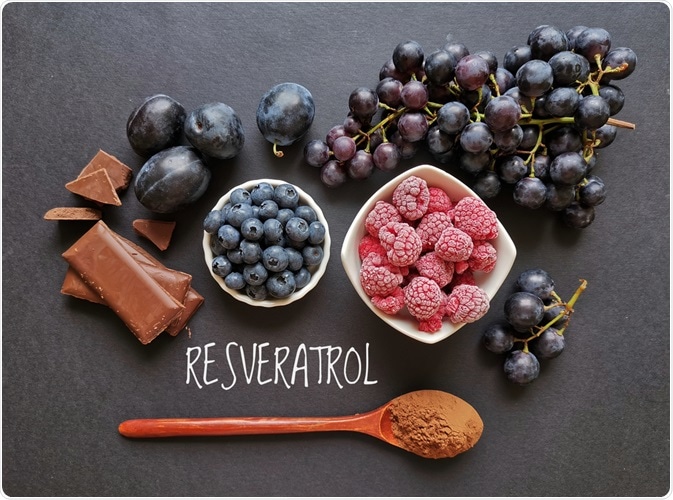Resveratrol is a phytoalexin, which means it is a protective antibiotic produced in plants under stress, whether due to fungal attack, drought, ultraviolet irradiation, or inflammation. This molecule helps the plants to fight back and maintain health.

Image Credit: Danijela Maksimovic / Shutterstock.com
Resveratrol in plants
Scientists became interested in resveratrol because of its antioxidant properties. Found in many varieties of plants, this polyphenolic compound was thought to possibly confer longevity, anti-inflammatory, heart-healthy, and anti-cancer properties through a variety of mechanisms.
Resveratrol is abundant in the skin of red grapes, peanuts, and pistachios, as well as in berries, such as blueberries and cranberries, raspberries and mulberries, and cacao beans. It is also found in significant concentrations in red wine.
While all red grapes contain resveratrol in their skins, purple or red grapes, as well as grapes from cooler regions, have a higher concentration of this compound as compared to that which is present in thin-skinned white or green grapes, or grapes from warmer countries. Moreover, thick-skinned Malbec or muscadine grapes have the highest concentration of all. Resveratrol is also found in the seeds, stems, and leaves of these grape vines.
Why is it important?
Resveratrol, like other antioxidants, causes the body to efficiently detoxify molecules that oxidize other molecules and tissues. Typically, normal body metabolism gives rise to highly reactive and oxidizing molecules called free radicals. Their production is greatly increased during inflammation and stress. Free radicals can cause alterations in DNA, cell membranes, and other vital cellular structures like mitochondria by oxidizing them.
Antioxidants protect the body against these dangerous molecules by capturing and defusing them, thus removing them from the cell environment. Antioxidants also offer themselves to be oxidized by the free radicals, but regenerate themselves. This protects other key molecules and cells from oxidative damage. For this reason, antioxidants are mostly reducing agents, like thiols and polyphenols.
Antioxidants also help immensely to repair the damage caused by oxidizing agents. Thus, healthy levels of antioxidants, like vitamin C, vitamin E, and selenium, are essential to prevent chronic inflammatory damage, arrest pre-cancerous changes, and slow aging changes.
This compound has been actively studied for over 20 years since it was found to be abundant in red wine. It was thought to provide a possible answer to the French paradox, that despite a rich diet of breads, pork, butter, and cheese, the French were notable for a relatively low rate of coronary heart disease.
Resveratrol is well-absorbed after oral administration and is highly active in the body, yet it has a low bioavailability. This compound is rapidly metabolized, and hence the levels of unmetabolized resveratrol in the blood are low. Resveratrol is detected largely as metabolites in both the blood and urine; however, the bioactivity of these metabolites being as yet unknown. Additionally, resveratrol is fat-soluble and is found as a glucose-bound form or a glucoside, called piceid.
Actions of resveratrol
5 Amazing Facts About Resveratrol That You Need to Know
Resveratrol is thought to elicit the following benefits based on early research:
- Anti-inflammatory action
- Antioxidant effect
- Prevents atherosclerosis via several mechanisms:
- Prevents the oxidation of LDL cholesterol
- Inhibits platelet aggregation and clot formation
- Inhibits specific cell adhesion molecules which are needed for atherosclerotic plaque buildup
- Inhibits smooth muscle cell proliferation which contributes to atherosclerosis
- Stimulates eNOS activity, which produces nitric oxide, a powerful vasodilator, mitigating hypertension
- Prevents cancer cell maturation and proliferation, and triggers apoptosis, or programmed cell death, in cancer cells
- Reduces the risk of Alzheimer’s disease by preventing plaque formation
- Increases sensitivity to insulin, thus preventing diabetes mellitus
- Protects against the harmful effects of obesity and aging
- Increases the lifespan significantly in a dose-dependent manner in yeasts, fish, and flies, as well as other lower species by activating the Sir2 gene
- In low doses, resveratrol produces significant gene alterations in mice, similar to the heart-healthy effects of caloric restriction (or dieting), resulting in less obesity and delayed aging changes
Resveratrol is a phytoestrogen, which means it is a plant compound with estrogenic activity. It has a broadly similar structure to diethylstilbestrol (DES), which is a synthetic estrogen agonist.
However, resveratrol has been shown to have both estrogenic and anti-estrogenic activity, depending on the type of estrogen receptor, the presence of endogenous estrogens, and the cell type. In breast cells, in the absence of the natural estrogen 17β-estradiol resvertraol can act as an estrogen agonist. Comparatively, when in the presence of estradiol, resveratrol instead acts as an estrogen antagonist.
References
Further Reading
Last Updated: Apr 9, 2021